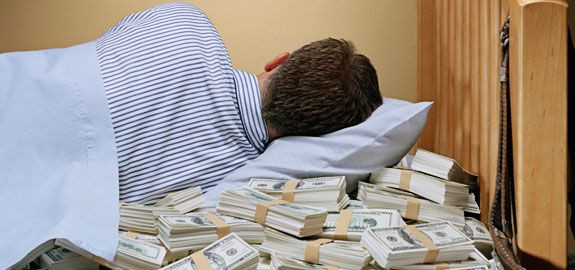Sleep Deprivation Makes Consumers Buy More Food: Could More Rest Save Your Wallet And Waistline?

Heading to the grocery store? Make sure that you’re well-rested first.
A new study from Uppsala University in Sweden reveals that people are prone to splurging on food following sleep deprivation, even after only a single night of poor slumber.
Obesity has blossomed into a public health crisis in many developed countries over the past half-century, and a growing body of evidence suggests that sleep deprivation factored into this upward trend. The latest investigations have revealed the intricate and multifaceted ways that losing sleep promotes weight gain. Innovative brain scans have explored why sleep deprivation makes people crave junk food, while other studies have shown that resting helps people stay slim.
Researchers at Uppsala wondered if less sleep could also impact people’s financial decisions with food purchases.
“We hypothesized that sleep deprivation’s impact on hunger and decision making would make for the ‘perfect storm’ with regard to shopping and food purchasing—leaving individuals hungrier and less capable of employing self-control and higher-level decision-making processes to avoid making impulsive, calorie-driven purchases,” said first author Colin Chapman, a neuroscientist at Uppsala University.
Chapman and his colleagues asked 14 men with average weights and healthy sleep patterns — eight hours per day — to go grocery shopping with a $50 budget. They were asked to shop from a list of 40 items: half were high-calorie items while the remainder were low-calorie foods.
The subject performed this task either after an evening of full rest or after staying up all night. Each subject was given the same breakfast — a yogurt shake and two slices of bread — before they went shopping in the mock market. This was done to minimize the effects that hunger may have had on their food choices.
Sleep-deprived men preferred to buy unhealthier foods. Their choices had about nine percent more calories than well-rested subjects, and they bought about 18 percent more food — as judged by weight in grams.
What’s interesting is that this relationship held firm in a second trial where the high-calorie foods cost 25 percent more than the healthy options. These results argue that losing sleep sways a person’s decision-making toward wanting unhealthy foods regardless of the price.
Blood measurements showed that sleep deprivation increased the levels of ghrelin, a “hunger” hormone that increases the desire for high-calorie foods. This happened in spite of the fact that the subjects were fed right before beginning the exercise.
“Our finding provides a strong rationale for suggesting that patients with concerns regarding caloric intake and weight gain maintain a healthy, normal sleep schedule,” concluded Chapman, who says that the next step is to see whether sleep deprivation promotes impulse buying.
Source: Chapman CD, Nilsson EK, Nilsson VC, et al. Acute Sleep Deprivation Increases Food Purchasing in Men. Obesity. 2013.
Published by Medicaldaily.com



























